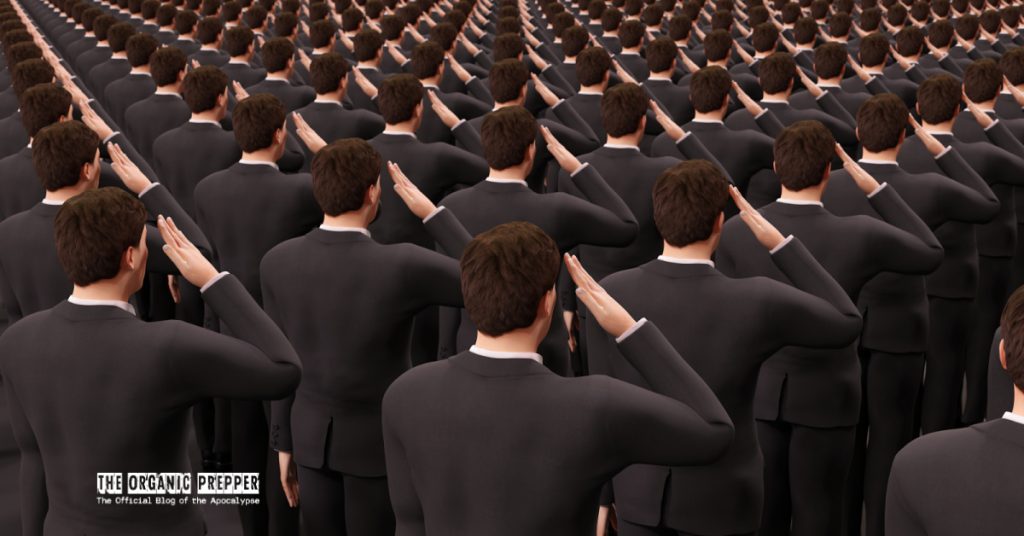by Daisy Luther, The Organic Prepper:

While this was originally written by Italian philosopher Giovanni Gentile, Benito Mussolini took this statement and made it his own
The word “fascism” gets tossed around a lot, but let’s look at the history behind it so we can better understand this political movement. Mussolini used to confidently declare that the 20th century would be the century of fascism. And while he was roundly defeated in World War II, his ideology may have been the winner in the long run.
TRUTH LIVES on at https://sgtreport.tv/
Fascism was never a well-developed school of thought, in the way Marxism and Leninism were. It emerged as a response to socialism in the aftermath of the First World War.
Mussolini’s fascism
While Italy was technically one of the Allies during World War I, most Italians did not want to fight. Italy still had a far lower standard of living than most of the rest of Europe at this time. Mussolini loved fighting, though, and published opinion pieces in the pro-war newspaper he founded, Il Popolo d’Italia (The People of Italy). As an example of his mindset, you can read his article “Trenchocracy” about the new spiritual elite he believed would emerge as a result of engaging in warfare.
In this 1917 article, he also refers to “an anti-Marxist socialism, a national socialism,” which, as history nerds know, is what Hitler called his political movement, too.
After World War I, when Italy did not get the territory it had been promised, the Italians were humiliated. Mussolini wrote up a manifesto in 1919 that included a mixture of progressive and conservative demands. For example, while Mussolini loved war and soldiers, he hated arms manufacturers and proposed an 85% tax on war profits. He also advocated abolishing the monarchy.
In 1921, however, when Mussolini officially formed his Fascist party, he dropped the progressive demands for a free republic and supported the monarchy.
Why the change?
Well, between 1919 and 1921, the landowning class decided they really liked Mussolini. Wealthy Europeans had watched in horror as Bolshevik revolutionaries in Russia slaughtered the royal family and proceeded to throw Russia into absolute chaos.
Italy had its own share of leftist agitators, too, who absolutely terrified the genteel classes. Mussolini had been a socialist for a while, but he separated himself from them in his glorification of war. Because Mussolini didn’t like socialists and because he enjoyed organizing gangs to fight against anyone he didn’t like, the landowning classes were more than happy to use him to fight against socialist groups. They supplied him with trucks and weapons and let him do their dirty work.
Mussolini’s Fascist party won very few elections. But they were put into power by a wealthy elite that feared communism above everything else.
And once in power, Mussolini worked to make it complete. In 1922 he coined the word “totalitarianism” to describe his idea of a state that encompassed all facets of life. Of course, Mussolini personally failed. But his ideas lived on.
How fascism is different from communism
Communism and fascism are similar in that both states discount the importance of the individual. The cults of personality involved in Communism have made those regimes easily identifiable. Stalin, Mao, Pol Pot, and the Kim family of North Korea: all these men created regimes so obviously horrible that very few people claim to want communism anymore.
But fascism is a little different in that it allows for more independent business functions as long as those businesses support the aims of the ruler. While Mussolini created a cult of personality for himself, it’s not as necessary to the fascist system, especially with our 21st-century mega-corporations. We may not see posters of our leaders all over our walls, but corporate logos are so ubiquitous we don’t even notice them anymore.
And with fascism, corporations can be the arm that wields the whip.
Meanwhile, in America, corporations punish dissenters.
The U.S. and the rest of the Western world like to talk a good game when it comes to democracy, but how truly democratic are our societies? How are dissenters treated? We like to think that the Western world is a beacon of freedom because people like Alex Jones and Joseph Mercola aren’t locked up. But are they treated like equal citizens?
The OP knows personally what happens to truly independent media outlets. We’ve been the victim of downgrading, which affects advertising and how the site earns money. We’ve also been targeted for deliberate defunding.
And we’re hardly alone.
Dr. Mercola was recently debanked, as we wrote about here. He wasn’t being accused of any crimes. His voice is merely inconvenient for the establishment. Law enforcement can’t get him for anything, so they got the corporate powers to punish him.
Some anonymous women have made rape and harassment allegations against Russell Brand. Though he hasn’t been found guilty of anything, his YouTube channel has been demonetized. Once again, even though charges against him have not been verified in a court of law, corporate powers have been used to punish him.
Read More @ TheOrganicPrepper.ca



